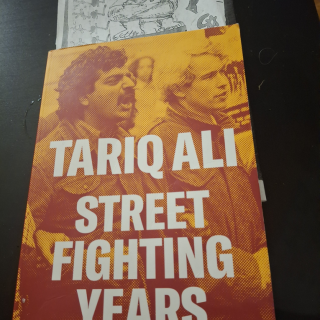This year is the fiftieth anniversary of the many things that occurred in America’s most horrible year in the most tumultuous decade of the twentieth century. In some ways it’s an anniversary for me, too, because it marks when I became aware of and interested in American politics and history. I remember 1968 as a bubbling cauldron of assassinations, demonstrations, and confrontations near and far. By the time my sixth grade school year was over, there had been Tet – a former neighbor and two of my older sister’s classmates died in Vietnam – President Lyndon Johnson’s declaration that he would not seek reelection; the assassinations of Martin Luther King, Jr. and Robert F. Kennedy; the televised execution of a Vietcong officer by the South Vietnam chief of police; and numerous urban rebellions in cities across America. My mother had subscriptions to the weekly magazines Life, Look, and Newsweek, and I looked at them again and again. Nineteen sixty-eight was indeed, as the Temptations sang several years later, a ball of confusion.
As can be expected, there have been a number of books about various subjects written to commemorate and analyze that annus horribilis. LBJ’s 1968 stands tall among them. Longley’s book benefits greatly from the fifty-year span by allowing him to mine fresh resources and look at contentious passions that have long since cooled. He examines ten incidents that happened during Johnson’s last year in office and how he dealt with them.
We clearly see a multifaceted man in this book, who, as Lady Bird was fond of saying, “was a pretty good man to have around during a crisis.” The extraordinarily crude man was definitely on display, even in front of journalists. When they asked LBJ to explain U. S. involvement in Vietnam, he “. . .unzipped his fly, drew out his substantial organ and declared, ‘This is why!’”
He was ever the patient diplomat as he worked for a year to free the captives of theUSS Pueblo, which was performing intelligence work off the coast of North Korea. LBJ understood the frustrations of African Americans who rioted after the brutal murder of Martin Luther King, Jr. He ordered the Marines guarding the Capitol not to load live ammunition, and simultaneously pushed Congress to pass the languishing open housing bill. Johnson even managed to put aside his hatred for his great rival, Robert F. Kennedy, after he was assassinated, dispatching private jets to pick up three of the Kennedy children from their boarding schools and fly them to Los Angeles. He also ensured behind-the-scenes assistance to the Kennedy family as they planned to lay Robert Kennedy to rest. He was solicitous of Ethel Kennedy, and openly admired the grit Rose Kennedy showed as she buried the third of her four sons, all of whom had died by violence.
The same Johnson who showed such magnanimity when he declined to run for another term as president in 1968, however, undermined his Vice President, Hubert Humphrey, as he campaigned for and then captured the Democrat’s nomination. He went to great pains to ensure that Humphrey could not stake out his own position on what needed to be done in Vietnam, thereby tightly tying him to LBJ’s failed execution of the war. Furthermore, he meddled in the Democratic party’s plans for the convention in part to maintain control, but also secretly hoping the party would turn to him. Johnson could not bring himself to leave the stage, and Humphrey’s presidential hopes suffered the consequences.
The war was not the only reason LBJ declined to run in 1968. He had promised his wife, Lady Bird, that the 1964 campaign would be his last. His physician told the Johnsons that his health was so bad, it was unlikely that he would live through another term. His initial decision not to stand for reelection seemed generous and selfless when he made it, but within a month, he was just another lame duck president trying to get Congress to complete his agenda.
Moreover, America was increasingly caught up in a strong conservative backlash as white southerners pushed back against racial equality and civil rights. The backlash was clearly seen when the Solid South deserted the southern president in the presidential election of 1964, and the losses–larger than expected–during the midterm election of 1966. For white southerners, LBJ’s signing of the Voting Rights Act was the last straw. White working class and poor voters began leaving the Democratic party, and we can still see the consequences of that today.
What LBJ referred to as “that bitch of a war” overshadowed everything. All the good his administration had done was undone by the increasingly unpopular, expensive, divisive war. He could not possibly ignore the demonstrators who stood outside the White House chanting “Hey, hey, LBJ, how many kids did you kill today?” He could not bear to admit that his decision on escalating the war was wrong, even as he asked for more troops; nor could he admit he was captive to an implacable foe whose people appeared to have no problem matching each increase in those troops. Both of Johnson’s sons-in-law were in Vietnam, and that caused him great personal anguish. The financial cost of the war destroyed the Great Society before it barely began, and the societal costs were borne out in the urban rebellions that sprung up in large American cities during the long, hot summers of the era.
One of the things that surprised me about LBJ’s 1968 was how difficult it was for LBJ to get Congress to pass meaningful gun control laws even in the aftermath of the assassinations of Martin Luther King, Jr., and Robert F. Kennedy. Then as now, the National Rifle Association was powerful and feared. Many members of Congress had already become captives of the NRA and depended on their support and financial contributions. Even RFK’s support for gun control laws in the aftermath of his brother’s assassination fell on deaf ears.
LBJ’s 1968 is well researched and compelling; I could hardly put it down. It reminds us that for all his faults–and they were great–LBJ cared about and worked long and hard for a better, more just, and more prosperous America.
Longley has given us a new and nuanced view of the president, and for that we should be grateful.



